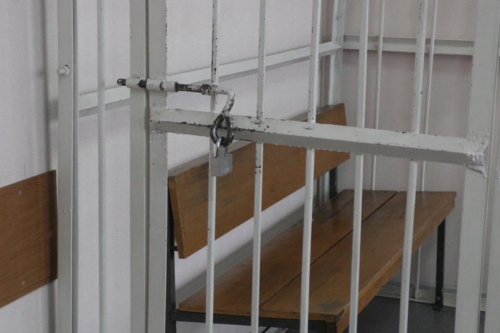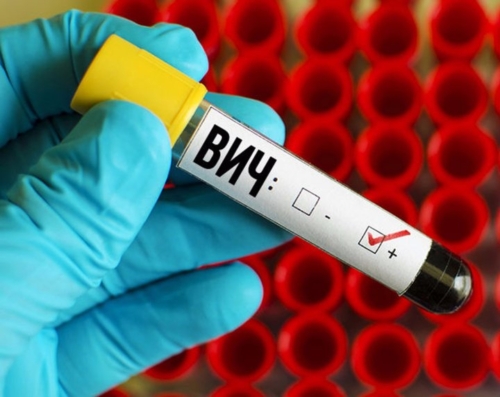
Nushawn Williams To Remain Confined After Latest Ruling
The latest attempt by Nushawn Williams to be released from custody has been denied.
Williams, 46, had appealed a state Supreme Court order continuing his civil confinement to a secure treatment facility. His appeal followed an annual review hearing under the state’s Mental Hygiene Law that found he remains a dangerous sex offender.
A native of Brooklyn and former resident of Jamestown, Williams reportedly learned he was HIV-positive when he was 19 years old. He is alleged to have had unprotected sex with dozens of women in the mid-1990s without disclosing he had the human immunodeficiency virus.
His case in Chautauqua County, which made national news, came to light after numerous women began testing positive for HIV at local health clinics.
Williams, who changed his name to Shyteek Johnson, pleaded guilty to charges of second-degree rape and first-degree reckless endangerment.
While his 12-year prison sentence concluded in 2010, he has remained in confinement after a review determined he was still a danger to society.
On Friday, the Appellate Division of state Supreme Court, Fourth Department, affirmed an order from July 2021 that Williams remain in a secure treatment facility. The court found that the state “presented legally sufficient evidence that petitioner has serious difficulty controlling his behavior within the meaning of the Mental Hygiene Law.”
Further, their ruling noted: “Respondents’ expert testified that petitioner had not made sufficient progress in treatment; that he failed to address his sexual deviance, which included a desire to have sex with underage girls; and that he failed to recognize how his substance abuse was related to his sexual offenses.”
Williams contended the state Supreme Court erred in denying his motion for a change of venue; the evidence was legally insufficient to establish he is a dangerous sex offender requiring confinement; and that ongoing confinement is against the weight of the evidence.
He was represented in his latest appeal by the Sage Law Firm Group of Buffalo.
Nushawn Williams loses bid to be released from civil confinement
Nushawn Williams, the notorious sexual offender who had sex with dozens of Jamestown area women even though he knew he was infected with the HIV virus, has lost his latest appeal to be released from civil confinement.
A State Supreme Court panel agreed that he suffers from a mental abnormality that “predisposes him” to commit sexual offenses.
After serving a 12-year prison sentence for rape and reckless endangerment, Williams was moved into civil confinement in 2010 under the Sex Offender Management and Treatment Act. In civil confinement, adult sexual offenders who are deemed likely to re-offend are held in a secure treatment facility after their prison terms have been served.
Williams challenged his confinement in 2013, but Justice John L. Michalski upheld the decision.
And the appellate judges affirmed Michalski’s ruling last week.
The panel rejected Williams’ claim that the court mistakenly determined that he was a dangerous sex offender.
It also said the experts’ evidence supports his “mental abnormality” regarding sexual conduct, in addition to him having an antisocial personality disorder to an extreme degree.
One expert also diagnosed him as a sexual sadist, based in part on a 13-year-old victim’s testimony about his violent and degrading treatment of her.
“The evidence also established that, in 1996, after he was advised that he was HIV-positive, respondent, using charm and/or force, engaged in sexual relations with 42 females (and) two inmates,” the judges wrote.
What’s more, the court wrote that two corrections officers reported that Williams “stated that he intended to continue that behavior upon his release, specifically referencing underage girls.”
Along with that, Williams, who now goes by the name SJ, “failed to complete sex offender treatment and had a poor prison disciplinary record prior to 2006,” the panel continued.
Williams, now 38, had pleaded guilty to two counts of second-degree rape and one count of first-degree reckless endangerment after he was accused of having sex, both consensual and forced, with dozens of women and underage female partners without telling them he was HIV positive.
One conviction was connected to the 13-year-old who was one of more than a dozen victims Williams infected with HIV.
Offenders confined under the Sex Offender Management and Treatment Act can be held indefinitely. With denial of his appeal, Williams has no release date set.
Jury denies Nushawn Williams' freedom, places him back in state custody
HIV test, justness of law likely to color Williams' trial
Nushawn Williams, the Jamestown man who gained national notoriety when accused of spreading the virus that causes AIDS, remains behind bars more than 15 years after his criminal offenses in Chautauqua County. But when a 20-year-old Buffalo man admitted in 2011 to having unprotected sex with four young women and a 15-year-old girl while knowing he was infected with HIV, he was sentenced to a year in jail for his crimes.
“It was similar enough to say, ‘My God, the treatment was so different,’ ” said John R. Nuchereno, defense attorney for Williams. Williams, now 36, was supposed to be freed in 2010, upon completing a 12-year sentence for a statutory rape and reckless endangerment conviction. Yet, three years later, he remains in Wende State Correctional Facility because the state attorney general contends Williams is a sexual predator likely to infect others with HIV.
The trial, while not open to the public, is expected to draw plenty of interest, both from civil liberties groups troubled by the state’s civil confinement policy and from various HIV and AIDS organizations intrigued by the potential legal impacts of the case.
Nuchereno already has made the stunning claim in a pretrial hearing that Williams does not have HIV, based on a recent electron microscope analysis of his blood by the University of Massachusetts School of Medicine. The contention appears likely to be a crux of Williams’ defense, which is being aided by the Office of Medical and Scientific Justice, a nonprofit organization based in Studio City, Calif. The group runs the HIV Innocence Project and has used electron microscopy results in military trials to help defend soldiers accused of transmitting the virus to sexual partners.
G. Baron Coleman, an Alabama lawyer connected with the Office of Medical and Scientific Justice who has represented several soldiers, is expected to assist Nuchereno in at least a portion of his defense of Williams. Lawyers from the Attorney General’s Office questioned the legitimacy of the electron microscope test and asked State Supreme Court Justice John L. Michalski to allow them to do their own analysis of Williams’ blood. Rules of law prohibited Michalski from agreeing to the request.
But several medical professionals and HIV experts contacted by The News said the electron microscope was not an accepted method for finding HIV or for monitoring a patient infected with the virus. “Electron microscopy is not, never has been and never will be an appropriate, relevant or approved way to detect HIV in the blood. Indeed, it’s beyond silly suggesting it could, would or should be used for this purpose,” said John Moore, professor of microbiology and immunology at Weill Cornell Medical College in New York City.
Williams’ blood was analyzed in April by Gregory M. Hendricks, manager of the Core Electron Microscopy Facility at the UMass Medical School, who found “no evidence” of HIV, according to a letter he sent to the Office of Medical and Scientific Justice. Dr. Joseph S. Cervia, clinical professor of medicine and pediatrics at Hofstra North Shore-LIJ School of Medicine, noted that blood tests screening for the presence of HIV antibodies have been used reliably for years to determine whether someone has HIV.
Seth Kalichman, an HIV and AIDS prevention and treatment researcher, expressed concern that the startling legal strategy in the Williams case will mislead people about accepted science with regard to diagnosing and treating HIV. The Office of Medical and Scientific Justice and its executive director, Clark Baker, are HIV and AIDS denialists, Kalichman said. And he said their efforts are potentially damaging to public health. “They have no credibility. They’re not really scientists at all,” Kalichman said.
The organization has become adept at trying to manipulate juries in court-martial cases by raising suspicions about HIV tests and the influence of big pharmaceutical companies, he said. And that’s potentially destructive, because some people who test HIV positive can’t deal with the reality and will seek out the misinformation put out by AIDS denialists as a source of comfort, said Kalichman. “These guys provide them with a way out,” he said. “There have been people who have died because they listened to these people.”
Baker, though, contends that the standard tests to detect HIV are unreliable and useless and that the electron microscope “is the only device that will see” the virus. “If he’s infected with it, why wouldn’t it be there?” said Baker, who began examining Williams’ case in 2010. Baker said he looked through hundreds of pages of Williams’ medical records and found no evidence of a proper HIV diagnosis. “If you’re going to accuse somebody of being infected with HIV, you’d better have some evidence,” he said.
Authorities accused Williams of infecting at least 13 young Chautauqua County females, including a 13-year-old and a 15-year-old. The case never went to trial, so the public didn’t get a close look at the criminal evidence against him. Nuchereno said his client has been contacted over the years by numerous groups that “have offered assistance, including mainline HIV organizations because they see this as criminalization of a disease.”
After completing his prison term for his admitted sex crimes, Williams now is subject to a law that was passed nearly eight years after he pleaded guilty with the understanding that he would be released from prison in no more than 12 years. In effect, the plea deal has changed, even though Williams never consented to the changes.
“It’s really unforgiveable in 2013. This application of the law is informed by grossly outdated misunderstandings of HIV, and the state should really be ashamed about it,” said Catherine Hanssens, executive director of the Center for HIV Law & Policy in New York City. Hanssens said we still don’t know “who infected who” in the Williams case, and the state’s civil confinement law makes it possible for anyone with HIV to be held indefinitely for infecting a sexual partner.
But Burstein maintained that the state has a case no matter what Williams’ HIV status may be because of Williams’ “known predatory behavior with young girls.” “Regardless of whether he was positive or negative, that’s just unconscionable,” she said. “Developmentally, 13- and 15-year-olds don’t have the cognitive ability to understand what they’re consenting to.”
Thomas Shevory, who wrote a book chronicling the media spectacle around the case, said he has no idea whether the current legal strategy will persuade a jury. But Shevory, who has kept in contact with Williams, is convinced Williams is not a threat and that he wants to get out of jail, get a job and be with his wife and four children in Virginia. “At this point, for what he’s accused of, even if he’s guilty – which I’m not convinced of – 15 years is long enough,” said Shevory.
Attorney says NY man at center of 1990s HIV scare is not HIV-positive; seeks client's release
BUFFALO, N.Y. – Nushawn Williams, a New York drug dealer imprisoned amid accusations he infected 13 young women with HIV in the 1990s, does not have the virus that causes AIDS, according to his attorney, who said he arranged for a new blood test as part of efforts to get him released from prison.




